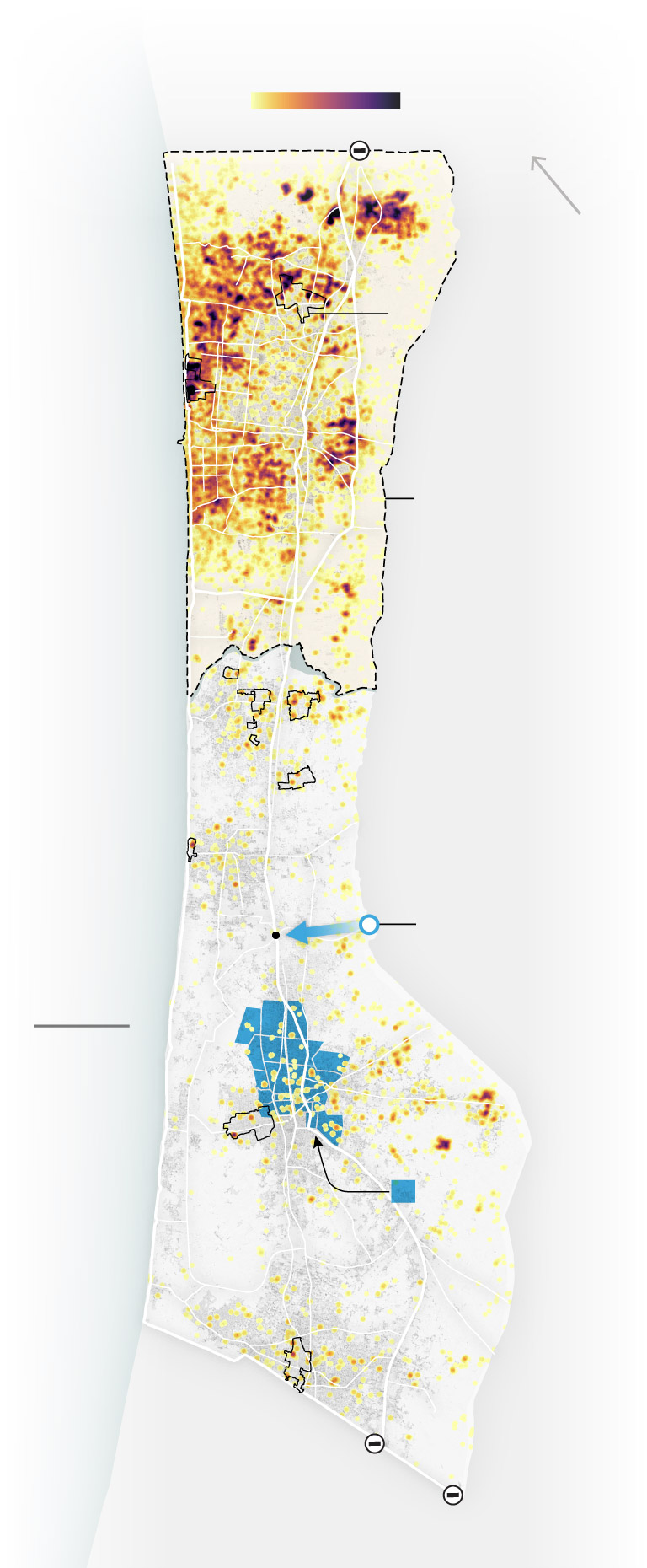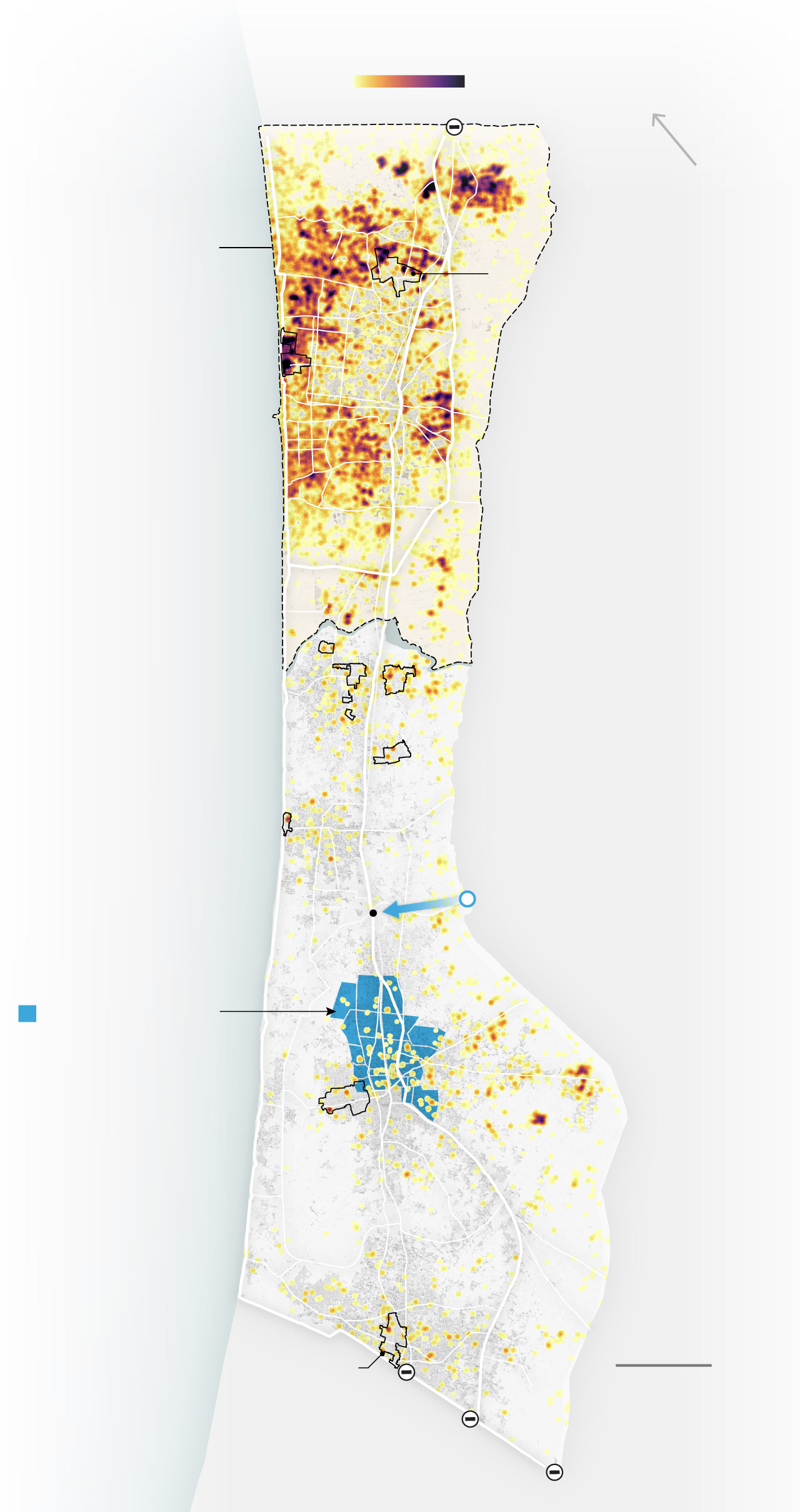The focal point of Monday’s operations was Gaza’s Salah al-Din road, which Israel had previously designated as an evacuation route for civilians fleeing from the north to the south. Israel Defense Forces announced for the first time on Monday that a section of the road north of Khan Yunis was a “battle zone” and that residents should no longer access it.
The IDF has identified “bypass” roads it said residents must travel instead, adding to the density of evacuation orders Israel has issued in recent days aimed at reducing civilian casualties. But aid groups have warned the guidelines are impractical, while Palestinians in Gaza say the guidelines are of little use in a place fraught with danger everywhere.
Late Monday, the Palestinian Red Cross said it had lost contact with its medical teams in Gaza after Baltel, the main telephone and Internet provider, said all telecommunications services had been cut.
Mirjana Spoljarić Eger, head of the International Committee of the Red Cross, said, “The level of human suffering is unbearable. said in a statement on Monday She visited Gaza. “It is unacceptable that there is no safe place for civilians to go in Gaza, and an adequate humanitarian response is currently impossible due to the military blockade.”
Israel has “entered a new phase in our war against Hamas,” Israeli military spokesman Rear Adm. Daniel Hagari said Monday since a week-long humanitarian ceasefire ended Friday, with Hamas and Israel blaming each other for its fall.
“We followed them in northern Gaza and now we are also following them in southern Gaza,” Hagari said in a recorded news statement. “We will act with maximum force against Hamas terrorists and infrastructure, while minimizing harm to civilians that Hamas places as shields around them.”
Separately, the Israeli military said in a statement on Monday that it had targeted hundreds of locations by land, air and sea in Gaza, including a weapons storage facility and a vehicle containing mortars, missiles and other weapons. The statement did not say when the strike took place.
Hundreds of Palestinians have been killed by Israeli attacks since Friday, according to Gaza’s health ministry, which on Monday said at least 15,899 had been killed, up from at least 1,200 since Hamas launched a deadly attack on Israel on October 7.
Despite the rising death toll, the White House said Monday it was “too soon” to determine whether Israel was doing enough to contain civilian casualties as its forces entered southern Gaza.
“Over the weekend, we basically saw 48 to 72 hours of activity. So it’s too early to tell you that I’m going to sit here and make some sweeping judgment,” White House national security adviser Jack Sullivan told reporters on Monday.
But as fighting intensified across Gaza, dangers to civilians piled up, including on Salah al-Din Road, the main thoroughfare connecting the north and south.
According to Hani Abu Mustafa, 39, who lives near the road north of Khan Yunis, heavy shelling in the area began on Friday after the pause. “We were being bombed by F-16s so devastatingly and frighteningly that we thought it was going to be our last night,” he said.
By Saturday morning, he said, scores of residents had left after the Israeli army dropped leaflets warning them to leave.
Abu Mustafa’s family wanted to leave. They had stayed in their homes for the past few weeks, wary of the “bitterness” that awaited them in evacuation shelters, he said. They left their home on Saturday morning when they saw Israeli tanks with their own eyes.
“We didn’t have time to carry any of our personal belongings,” he said. On Sunday, “we received news from neighbors who live near our house that the army has turned it into military barracks and is shooting passers-by on Salah al-Din Street.”
Witnesses said on Monday that Israel had established a checkpoint at the intersection of al-Madahen and Salah al-Din streets. Israeli forces previously operated a checkpoint in the same area when they occupied Gaza before withdrawing in 2005.
Sondos Daloul, 25, who stays with his family at a school on Salah al-Din Road in the Deir al-Balah area, said tanks have been taking positions in the area for the past few days. He said artillery fire injured people sheltering there.
More than 80 percent of Gaza’s population has already been displaced The figures were released on Monday By the UN Agency for Palestine Refugees, UNWRA. Overcrowded homes, hospitals, shelters and tent camps have contributed to the spread of disease and conditions such as diarrhea and skin infections, the UN said.

Based on the density of the damage
In satellite imagery
Israeli
Defense forces
Published
Discharge
order
to the north
There is Gaza
October 13.
Witnesses
View report
Israeli tanks
Entering Gaza
In Kisufim
Kate, moving
towards
Matahin
Meeting.
on Monday
The IDF said
Residents
In these areas
discharge
to areas.
Kerem Shalom
Commercial
passes through

Density of damage based on satellite imagery
Israeli security
Forces released
eviction order
to northern Gaza
On October 13.
Witnesses report
I saw Israeli tanks
South enters
Gaza in Kisufim
Kate, moving
Towards Matahin
meeting
Monday the
The IDF told residents
In these areas
discharge
For southern regions
and east.
Kerem Shalom
Commercial
passes through

Density of damage based on satellite imagery
Israeli security
Forces released
eviction order
to northern Gaza
On October 13.
Witnesses report seeing an Israeli
Tanks entering southern Gaza
At the gate of Kissufim, moving towards
Junction of Matah
On Monday, the IDF
Told the residents
In these areas
to empty
Southern regions and
East.
Kerem Shalom
Commercial cross
Israeli forces have “actually taken a very unusual step for a modern military and have identified precisely the area where they intend to conduct a ground maneuver,” Sullivan said of the evacuation announcements. “They asked people in the area to leave.”
But the instructions issued Monday did not provide specific directions for civilians moving south from Gaza City and northern Gaza, which Israeli forces have largely cut off since they began ground operations in late October.
“There is still one open corridor from north to south” on Gaza’s coastal road west of Salah al-Din, which is open from 11 a.m. to 5 p.m. Monday, IDF spokesman Nir Dinar said Monday.
He said the public was notified of the route through postings, pamphlets and text messages, but no postings were released Monday, and he did not immediately respond to a request for copies of the text messages and pamphlets.
Muhammad al-Natour, 42, a displaced Gazan who stayed north of Khan Yunis near Salah al-Din Road, said he had received Israeli evacuation notices: calls to the owner of the house he was staying in, demanding they leave and leaflets telling him to go to Rafah on the border with Egypt. .
His family complied with evacuation orders and moved west from the army. “If military operations extend to this area, we may suddenly be displaced for a third time,” he said.
Harp reported from London, Fahim from Beirut and Berger from Jerusalem. Kate Brown in Washington and Heba Farouk Mahfouz in Cairo contributed to this report.
